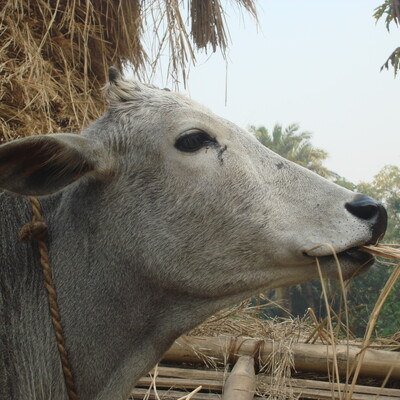
ILRI research on zoonoses, food safety and antimicrobial resistance highlighted at the 2022 Global ODA Forum
Food safety, zoonoses, antimicrobial resistance and animal health research findings by scientists from the International Livestock Research Institute (ILRI) and partners were presented at the 2022 Global ODA Forum for Sustainable Agricultural Development held 21–22 November 2022 in Seoul, South Korea.
The forum was hosted by the Ministry of Agriculture, Food, and Rural Affairs of Korea and organized by the Korea Rural Economic Institute as part of the 2030 Agenda for Sustainable Development. The forum included welcome or key remarks by Chung Hwang-keun, minister of MAFRA, Qu Dongyu, director general of the Food and Agriculture Organization of the United Nations (FAO), Ban Ki-moon, president and chair of the Global Green Growth Institute (GGGI), among others.
Fred Unger, regional representative for ILRI in East and Southeast Asia, shared how ILRI’s programs are addressing infectious diseases to improve the health of humans and animals. Unger also spoke about opportunities for research collaboration between ILRI, a CGIAR research centre, and the Republic of Korea. Key among these are initiatives to help reduce the risk of disease transmission from animals to humans. He said a ‘One Health approach could help tackle zoonosis diseases, food-borne diseases and antimicrobial resistance.’
Fred Unger, regional representative for ILRI in East and Southeast Asia, shared how ILRI’s programs are addressing infectious diseases to improve the health of humans and animals (photo credit: MAFRA).
Stressing the importance of livestock in low-and-middle-income countries (LMICs), Unger highlighted the sector’s critical role in achieving many of the Sustainable Development Goals (SDGs). He said the future growth of the sector will require balancing the rising demand for milk, meat, eggs in LMICs and minimizing the risk of pathogens spread from domestic animals to humans, especially in smallholder farming systems and informal markets that produce and sell 70% of animal-sourced food in LMICs. ‘We also need to reduce the threats of antimicrobial resistance (AMR), which is already causing 1.2 million deaths annually across the world and is projected to kill 10 million each year by 2050,’ he cautioned, adding that achieving this will require greater investment in research and diagnostics.
Key ILRI programs and projects that are using One Health to address zoonoses, food safety and AMR in Africa and Southeast Asia include:
- One Health Centre in Africa (OHRECA), which is developing research based One Health capacity in developing countries,
- the CGIAR One Health Initiative that is ensuring multidisciplinary and multi-sectoral involvement in One Health to address zoonotic disease threats,
- vector-borne disease research in urban areas of Vietnam, and
- food safety research (in Cambodia through the Safe Food, Fair Food for Cambodia project and in Vietnam through SafePORK project).
Key achievements from ILRI’s decade-long research on food safety in Southeast Asia at both policy and grassroots levels were presented at the meeting. These include low-cost interventions to improve the safety of food in Cambodia and Vietnam policy changes based on research. Others were ILRI’s contributions to the development of the Vietnam One Health Partnership for Zoonotic Diseases Strategy (2021–2025), the United Nations Food Systems Summit in 2021 and the National Action Plan for Food System Transformation in 2022.
Unger concluded by sharing the CGIAR’s plan ‘to support the development of sustainable livestock value chains, ecofriendly production and integrated animal and human health in LMICs’ by:
- Integrating ICT in livestock production with support from government agencies, academia and the private sector
- Disease control and prevention with private sector and academia
- Research and capacity building with academia and research institutes
Hu Suk Lee, professor at the Chungnam University and joint-appointed scientist at ILRI attends a panel discussion on infectious diseases (photo credit: MAFRA).
Unger and Hu Suk Lee, professor at the Chungnam University and joint-appointed scientist at ILRI also attended a panel discussion on infectious diseases. Unger emphasized on the importance of effective early detection and response system to be better prepared for new emerging disease treats. Lee explained how a Korean government-funded project that is ‘Improving human health through sustainable value chains in human-animal-environmental interactions using ICT in Vietnam’, is helping prevent, control or eliminate risks to human and animal health, a key element in ensuring sustainable agricultural development. The project is expected to contribute to the development of a surveillance, and early warning system on zoonosis using ICT and new ways of preventing and responding to important zoonosis in the country. ‘Using One Health is helping us bring together different sectors to produce evidence that can be translated into policies,’ Lee said.
Watch a video of the ILRI session at the forum here (from 05:10:05) and panel discussion (from 05:40:40)


















